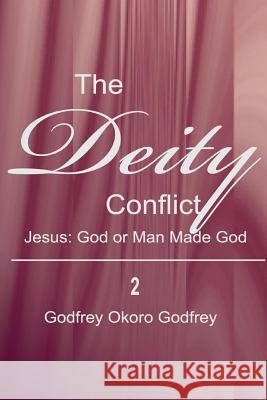The Deity Conflict: Jesus: God or Man Made God » książka
The Deity Conflict: Jesus: God or Man Made God
ISBN-13: 9781505619423 / Angielski / Miękka / 2015 / 488 str.
The Deity Conflict: Jesus: God or Man Made God
ISBN-13: 9781505619423 / Angielski / Miękka / 2015 / 488 str.
(netto: 63,32 VAT: 5%)
Najniższa cena z 30 dni: 66,49
ok. 16-18 dni roboczych.
Darmowa dostawa!
What is your position on the Christ? Is He the Son of God or not? 41 Others said, This is the Christ . But some said, Shall Christ come out of Galilee? 43 So there was a division among the people because of him. 47 Then answered them the Pharisees, Are ye also deceived? (John 7) The conflict arising from whether the Christ is the Son of God or the idea that it is a Christian aberration has been increasingly heating up, and is taking an uncanny dimension. What position do you hold? Is your position founded on credible evidence or what you get from questionable sources. Have you bothered to know and to consider other positions and to find out whether in verity your position is the right one. Have you also bothered to know why those who hold contrary views to yours are inclined to their views? The Deity Conflict is one book that has harnessed the various views of the worlds foremost religious groups on the conflict arising from whether the most outstanding personage in human history qualifies as Son of God or is just a human phenomenon imbued with supernatural powers. Perhaps no one subject has aroused a strong an interest and contention in the world's religions more than the divinity of our Lord Jesus Christ. Christianity has continued to propound the idea of a Son of God. It has also continued to predicate its highly exceptional teachings on this concept. All other various religious groups and even religious schools of thoughts have held strong and divergent views on the issue of whether the Lord God actually has a Son or not. Most non-Christian groups are flabbergasted that Christians teach and trumpet a concept as strange and so questionable as the Lord God having a Son. They have neither seen the need for this, nor could they conceive the idea of this in view of the fact that God is supposed to be one. By this then, the concept of a Christ as Son of God becomes highly debatable and intriguing so much so that Christianity has been most repeatedly lambasted on the basis of this idea. For many non-Christians who would want to change their religions on grounds of lack of satisfaction and incompleteness, perhaps the whole idea of a Son of God in Christianity constitutes the strongest reason for holding back. The disturbing idea has also given Christian detractors impetus to dissuade many of their own adherents against switching to Christianity. The fact that many, if not all other religions but Christianity have no idea of a Son of God in their scriptures, has frustrated the knowledge and spread of the truth from a larger percentage of the world. Islamic ideas especially, modern day Judaism, Buddhism, Hinduism and ideas of a host of other non-Christian related religions propagating God, have concepts of God that scream against the Christian position. The claim too is that the Christian position overtly suggests polytheism; especially for a religion which paradoxically beats its chest about a strong position in monotheism. This second series of The Deity Conflict can be best appreciated after having gone through the first book of The Deity Conflict. In Book 1, the positions of Hindus and Buddhists were presented and considered. This was followed by the position of Islam and sentiments by some Muslims on the matter. We also have a general interaction of some of the religions. These positions have actually spiraled from religion, into affecting the way people and nations react to one another."
Zawartość książki może nie spełniać oczekiwań – reklamacje nie obejmują treści, która mogła nie być redakcyjnie ani merytorycznie opracowana.











